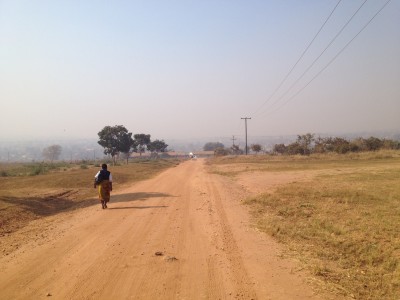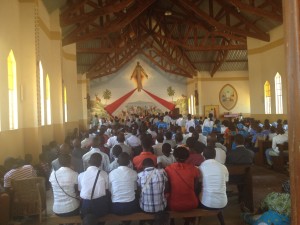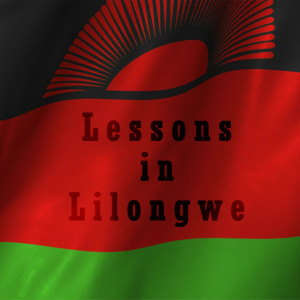In undergrad chemistry lab, you likely were introduced to the terms accuracy and precision, often represented visually by the spread of darts on a dartboard. You were told to keep track of significant figures based on how well the various graduated cylinders and titration pipettes could measure volumes. The goal was to express the answer with as much certainty as possible, given the tools at your disposal.
When working in global health, however, the certainty of chemistry lab measurements begins to seem quite foreign. As a Doris Duke International Clinical Research Fellow working at UNC Project-Malawi on a number of research projects related to HIV in pregnancy, self-efficacy and medication adherence, I am struck by the uncertainty that fills life as a global health researcher.
I flew a local airline from Zambia to Malawi when I moved here, and I was uncertain if I would be able to bring all of my bags given the 18-seater airplane’s weight restrictions. On my first day of work in Malawi, I was uncertain where to go or what responsibilities I would be assigned. When I tried to go to church on my first Sunday in Malawi, I was uncertain what time Mass started despite a thorough Google search. Several weeks into my ten month research adventure here, I was uncertain if I was doing my job effectively. I am still uncertain about how well I will work with the various research teams, or how the projects will pan out. Will I get publications out of the experience? Should I buy a car, ride a bike or keep bumming rides? Even the simplest things are uncertain — am I getting enough protein in my diet given the heavy focus on starches here, rice and nsima.
The irony is striking: I was doing a research year focused on data collection, yet uncertainty was rampant everywhere. As a One on the Enneagram, I want everything to be a bull’s-eye on the accuracy/precision dartboard — not just in my professional life, but in everything. Unfortunately, this is very difficult in a global health setting. When I wake up in the morning in Malawi, I am not sure exactly what I will be doing, what victories or defeats I will experience or if my colleagues will follow through on promised documents, revisions or deadlines.

Uncertain how to get to work, I found myself on this dirt road my first week, quite lost despite Google Maps.
If uncertainty arose in chemistry lab from the instruments used, from where does it arise in a global health setting? Unpredictability is an element of life here. One of the biggest disrupters of daily activities seems to be funerals. In Malawi, where the life expectancy is around 60 and the HIV prevalence rate is roughly 10%, there seem to be many funerals. I’m not sure how much is because people die younger or more frequently versus a different emphasis on family and proximity, but it does lead to frequent absences among team members — not something that can be planned around. Unpredictability extends far beyond funerals, though. The internet can randomly be down for hours, or the power can be interrupted when you’re in the middle of typing a document. The infrastructure within which the research is being conducted is unreliable, so research outcomes might vary.
Besides co-workers attending funerals, I also never seem to know when they will be taking one to three weeks of leave. One of the research team’s leaders apparently went to South Africa for a conference, and I found out later that he would not be back for almost three weeks! There was no forewarning of this and thus no way for me to plan around his absence. It always seems that members of the team are on leave for occasionally unknown reasons and uncertain durations.
I have explained to several of my friends in the United States that I like to wake up and know roughly what I will be doing hour-by-hour for the day, if not already knowing the night before or even several days in advance — especially if things are getting hectic and need more structure and organization. It is important to plan out our study schedules and research meetings so that we can claim as much autonomy as possible in our medical education.
I am a master scheduler, and I can juggle many things. But when much of that control is taken away from you, when you exist in a culture that is not your own, when traffic randomly appears at odd hours of the day, when police officers pull you over for whatever they please, when shuttle services run on whichever schedules they’d like — when all of these things laugh in the face of your desire to control, schedule and plan — then you must embrace uncertainty.

To find this church, I first sat at another Catholic church for over 30 minutes with the doors locked and no one around before someone alerted me that all the churches were convening down the road a few kilometers for a special Confirmation Mass. Then, I gave that family a ride there.
I have grown to enjoy how often I go to bed whenever I would like and wake up without an alarm, at whatever time I am ready to wake up. It is so different from surgery clerkship where 4 a.m. wake-ups could require several alarms. I am starting to enjoy having my workweek be exercises in flexibility, fluidity, adaptability and compromise. Uncertainty of how things will play out is not unique to the developing world, but I feel it on a more daily basis here. It is jarring and uncomfortable. I do not know if I will have good internet when I schedule a phone appointment or if the call will be foiled by technological issues. Apparently, the only good internet provider in Malawi is being stretched thinner all the time, so even if I have the best internet connection in Lilongwe, it too is suffering amidst an overburdened infrastructure.
In my quest to produce good, publishable results, I sometimes push too hard. I sometimes impose my American mindset on productivity too much and do not recognize that things run differently here. Language barriers and cultural differences are real struggles when trying to collect quality data, but I cannot pipette and titrate on my own like in chemistry lab. I must rely on my wonderful Chichewa-speaking team to help conduct the research, and this requires letting go of control and allowing for uncertainty. My hamstrings may be quite short and prevent me from physically touching my toes, but the mental exercise of living and working abroad is stretching my mind, my patience and my short fuse toward a new level of flexibility. Thus, as a scientist, as a rising physician and as a global health researcher, I am striving to be at peace with uncertainty.
Global health work can seem glamorous, exotic and noble. Lessons in Lilongwe presents introspection and critical observations to illustrate what global health research and living in Africa are really like. Come join Austin on his year off of medical school for a research fellowship in Lilongwe, Malawi.

